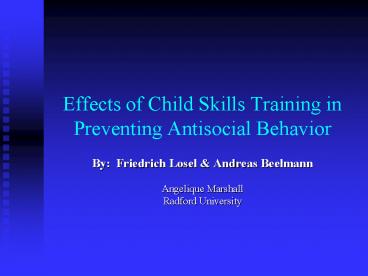Effects of Child Skills Training in Preventing Antisocial Behavior
Title:
Effects of Child Skills Training in Preventing Antisocial Behavior
Description:
Effects of Child Skills Training in Preventing Antisocial Behavior By: Friedrich Losel & Andreas Beelmann Angelique Marshall Radford University –
Number of Views:95
Avg rating:3.0/5.0
Title: Effects of Child Skills Training in Preventing Antisocial Behavior
1
Effects of Child Skills Training in Preventing
Antisocial Behavior
- By Friedrich Losel Andreas Beelmann
- Angelique Marshall
- Radford University
2
Purpose
- To analyze the preventive effects of child skills
training on antisocial behavior and related
outcomes. - provide a basis for a differentiated evaluation
of the preventive potential of child skills
training - permit conclusions on the practical
implementation of such programs - offer perspectives for practice, policy making,
and research
3
Literature Review
- All retrievable published or unpublished reports
in the English or German Languages that had
appeared no later than 2000 - Methods
- Electronic Sources- keywordsPrevention
antisocial behavior social skills training
evaluation meta-analysis childhood and
adolescence - Psyc-Info
- Medline
- Eric
- Dissertation Abstracts
4
Literature Review
- References given in existing reviews were checked
systematically - References given already identified primary
studies were analyzed for further relevant
publications - Studies
- Approximately 851 found
- 84 met eligibility criteria that included 135
treatment/control group comparisons
5
Studies to Include
- Must contain an evaluation specifically
addressing a social training program for the
prevention of antisocial behavior in children and
youth - Randomized control group design
- Pre-intervention and post-intervention data had
to be available - Age zero to eighteen years
- Focus on prevention
- Outcome measures data had to be reported in
sufficient detail to permit an adequate
computation
6
Potential ModeratorsIndependent Variables
- Publication year
- Sample size
- Type of randomization
- Type of treatment
- Trainers
- Age
- Type of prevention
7
Potential ModeratorsDependent Variables
- Experimental design treatment and control group
- Specifically addressing a social training program
for prevention of anti-social behavior - Post-intervention measurements
- Follow-up measurements
8
Results for Dependent Moderators
Outcome Measurements N Fixed Model d
Post-intervention total 126 .26 Significant from 0 Heterogeneity
Antisocial behavior 80 .17 Significant from 0 Heterogeneity
Social skills 61 .29 Significant from 0 Heterogeneity
Social-cognitive skills 57 .29 Significant from 0 Heterogeneity
9
Results for Dependent Moderators
Outcome Measurements N Fixed Model d
Follow up total 34 .14 Significant from 0 Heterogeneity
Antisocial behavior 20 .06 Heterogeneity
Social skills 16 .13 Significant from 0 Heterogeneity
Social-cognitive skills 12 .33 Significant
10
Results for Independent Variable Moderators
- Low sample size in many of the studies
- Performed multiple significance testing without
alpha adjustments - Some effects are based on only a few studies
- Random model is not very sensitive for moderator
effects - Moderators are to some extent confounded
11
Conclusion
- Studies demonstrate a positive overall effect
that is small but robust - Cognitive-behavioral programs targeting high-risk
youngsters who already exhibit some behavioral
problems seem to be particularly effective.































